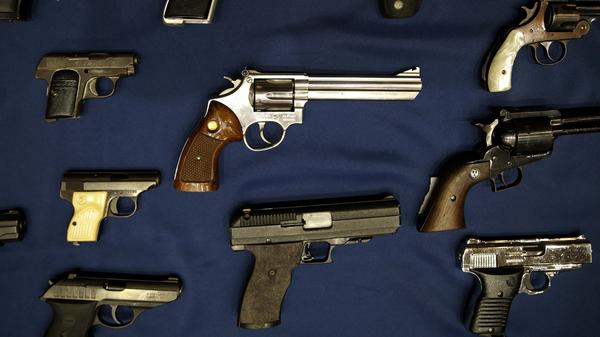So many facts point to the lie that our government and our country is actually
committed to effectively intervening on the plague of violence and terrorism.
This is among them. Another world is possible. ~ Molly
Guns seized by the police are displayed during an Oct. 2015 news conference in New York.
SETH WENIG AP
Three years ago, in July 2012, journalist Mark Follman heard about the Aurora, Colo., movie theater shooting rampage that left 12 people dead and felt compelled to learn more — not just about that incident, but about all the mass shootings that were occurring in America.
Follman, the national affairs editor of Mother Jones, began looking for information online, but it soon became evident that no good databases about the subject existed.
"I found a couple of perfunctory timelines that highlighted a couple of major attacks over the years, but that was it," Follman explains to Fresh Air's Terry Gross. "My response to that was just to think, 'This is crazy. How could there not be more information on this?' "
So Follman gathered a team of colleagues and began building his own database that would collect information such as how often mass shootings occur, who the perpetrators are and what weapons are being used.
Among his findings is the fact that 80 percent of the perpetrators in these attacks have used legally obtained firearms, and that a copycat effect often plays a big part in mass shootings.
Follman notes that the Columbine shooters, who shot up their high school in 1999, have a cult following, "The tragedy that they perpetrated became so seared into the public consciousness that it's created this whole culture online where you can go and there's people who obsess over their words and their images, and a lot of the people who have carried out these attacks since then ... have cited them as an inspiration."
Interview Highlights
On how the gun lobby has worked to suppress research on gun violence
The real pivot point is 1996 when Congress passed an appropriations bill with an amendment inserted into it that took money away from the CDC, which it had used a couple million dollars to study gun violence research the prior year, and the bill essentially said to the CDC, 'You can't do any research that could be used to advocate for or promote gun control.' What this did was create an enormous political chill on that work. It took away the money ...
And that chill wasn't just with government funding. I found in my reporting, talking to many public health experts and researchers that this chilling effect really trickled down into academia and into public health, that a lot of people felt after that, 'Look, why do I want to go and study gun violence? It's a hot-button issue. I'm going to get attacked for it.' I think a number of researchers have said that they became afraid that it would jeopardize their funding to study other things. So the effect from the gun lobby's politics and what it did with Congress 20 years ago, has really stymied our understanding of this problem.
On the impact of each state setting its own gun laws
After San Bernardino happened a lot of people who are on the conservative side of the gun regulation issue said, 'Oh well look, California has some of the most stringent gun laws in the country, and these people got these guns and they were legally obtained weapons, and so those laws don't work.' This is often said about Chicago — Illinois has strict regulations, Chicago has one of the worst urban gun violence problems in the nation. But in a sense that's a silly argument, as well, because these aren't uniform laws across the states, and a lot of the guns that are in play in Chicago are coming from Indiana. A lot of the guns that are in play in California are coming from Nevada, which is a place where you can buy guns really easily.
On 'The Columbine Effect' on mass shooters
Part of this investigative project became looking at what's known to people in this field as 'The Columbine Effect.' Columbine, as you know, was a watershed event in our recent history of mass shootings, where two high-school kids shot upColumbine High School in 1999, killing a dozen students and a teacher and injuring many others. They did it at a time when the internet was in its sort of early growth phase, it was the dawn of the internet age. They had recorded videos of themselves. Their goal wasn't just to kill, their goal was to become infamous for killing and in kind of a grim way they succeeded, perhaps beyond their wildest dreams.
Copyright 2015 Fresh Air. To see more, visit http://www.npr.org/programs/fresh-air/.
Please go here for the interview and transcript: http://keranews.org/post/us-has-mass-shooting-epidemic-no-government-database-gun-violence

No comments:
Post a Comment